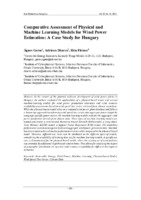Comparative Assessment of Physical and Machine Learning Models for Wind Power Estimation: A Case Study for Hungary

Megtekintés/
Metaadat
Teljes megjelenítés
Link a dokumentumra való hivatkozáshoz:
Gyűjtemény
Absztrakt
In the context of the planned mid-term development of wind power plants in
Hungary, the authors evaluated the applicability of a physical-based model and several
machine-learning models for wind power production estimation and wind resource
availability assessments based on wind speed time series retrieved from climate reanalysis.
While the physical-based model relies on a national wind power plant database and follows
a bottom-up approach transforming wind speed time series into aggregate power output by
using type-specific power curves, the machine learning models estimate the aggregate wind
power production directly from climate data. Three types of machine learning models are
trained and tested: a conventional Recurrent Neural Network (RNN) model, a Long Short-
Term Memory (LSTM) model, a Support Vector Regression (SVR) model. The modelling
performance is evaluated against historical aggregate wind power generation data. Machine
learning models achieved similar performance metrics when compared to the physical-based
model. However, different use cases can be attributed to the different types of models,
considering the availability of training data sets for machine learning models. A specific use
case is demonstrated for the physical-based model, where the existing set of wind turbines
was extended by additional, hypothetical wind turbines. This allows for analyzing the impact
of geographic distribution on expected wind resource availability for different development
scenarios.
- Cím és alcím
- Comparative Assessment of Physical and Machine Learning Models for Wind Power Estimation: A Case Study for Hungary
- Szerző
- Gerse, Ágnes
- Dineva, Adrienn
- Fleiner, Rita
- Megjelenés ideje
- 2024
- Hozzáférés szintje
- Open access
- ISSN, e-ISSN
- 1785-8860
- Nyelv
- en
- Terjedelem
- 18 p.
- Tárgyszó
- renewable energy, wind power, machine learning, physical-based model, wind speed time series, climate data
- Változat
- Kiadói változat
- Egyéb azonosítók
- DOI: 10.12700/APH.21.10.2024.10.13
- A cikket/könyvrészletet tartalmazó dokumentum címe
- Acta Polytechnica Hungarica
- A forrás folyóirat éve
- 2024
- A forrás folyóirat évfolyama
- 21. évf.
- A forrás folyóirat száma
- 10. sz.
- Műfaj
- Tudományos cikk
- Tudományterület
- Műszaki tudományok - multidiszciplináris műszaki tudományok
- Egyetem
- Óbudai Egyetem
